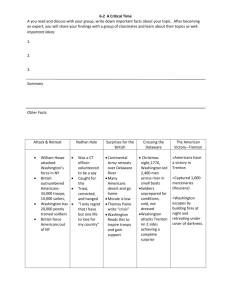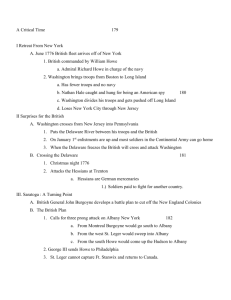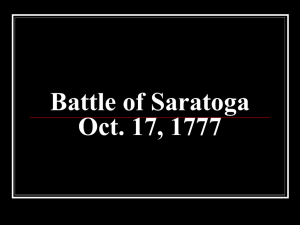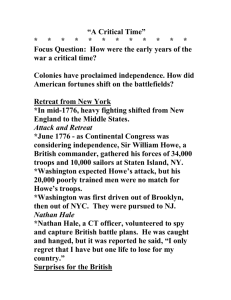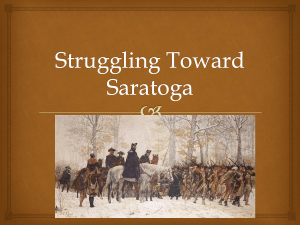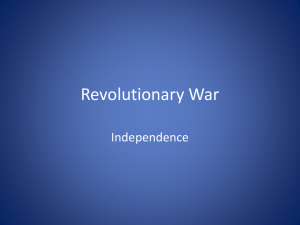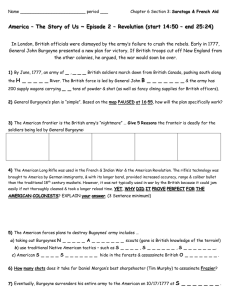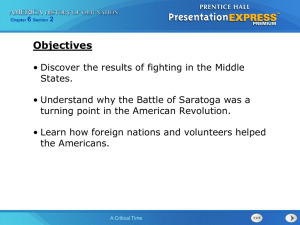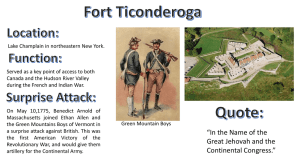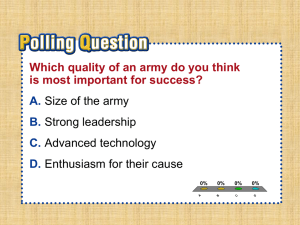File
advertisement
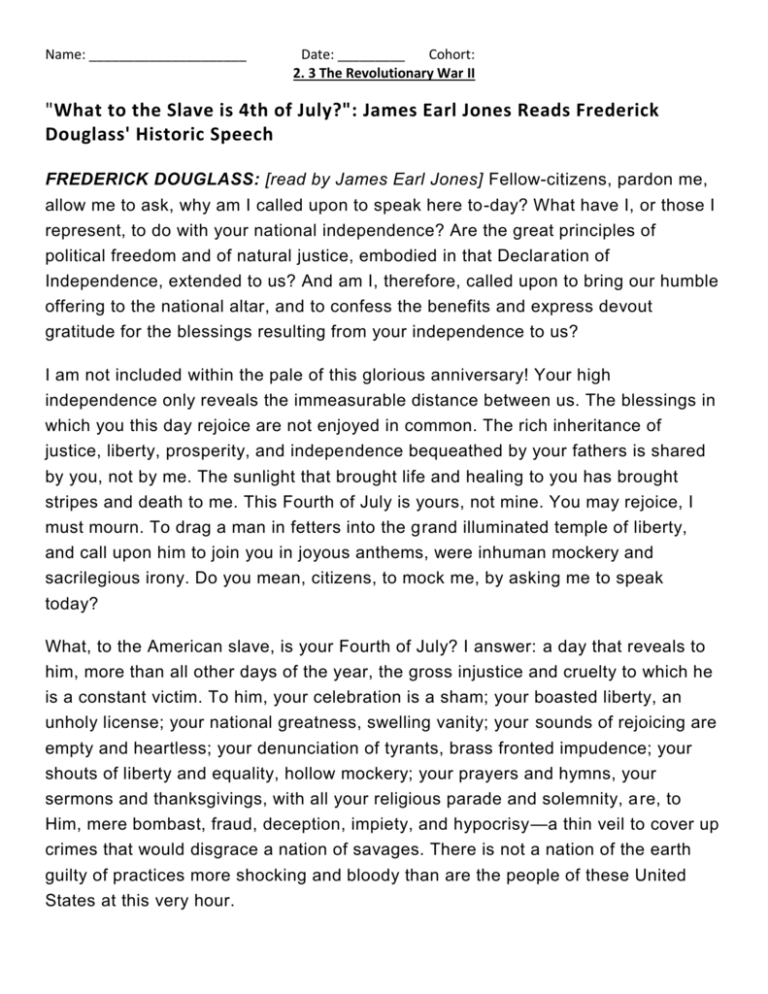
Name: _____________________ Date: _________ Cohort: 2. 3 The Revolutionary War II "What to the Slave is 4th of July?": James Earl Jones Reads Frederick Douglass' Historic Speech FREDERICK DOUGLASS: [read by James Earl Jones] Fellow-citizens, pardon me, allow me to ask, why am I called upon to speak here to-day? What have I, or those I represent, to do with your national independence? Are the great principles of political freedom and of natural justice, embodied in that Declaration of Independence, extended to us? And am I, therefore, called upon to bring our humble offering to the national altar, and to confess the benefits and express devout gratitude for the blessings resulting from your independence to us? I am not included within the pale of this glorious anniversary! Your high independence only reveals the immeasurable distance between us. The blessings in which you this day rejoice are not enjoyed in common. The rich inheritance of justice, liberty, prosperity, and independence bequeathed by your fathers is shared by you, not by me. The sunlight that brought life and healing to you has brought stripes and death to me. This Fourth of July is yours, not mine. You may rejoice, I must mourn. To drag a man in fetters into the grand illuminated temple of liberty, and call upon him to join you in joyous anthems, were inhuman mockery and sacrilegious irony. Do you mean, citizens, to mock me, by asking me to speak today? What, to the American slave, is your Fourth of July? I answer: a day that reveals to him, more than all other days of the year, the gross injustice and cruelty to which he is a constant victim. To him, your celebration is a sham; your boasted liberty, an unholy license; your national greatness, swelling vanity; your sounds of rejoicing are empty and heartless; your denunciation of tyrants, brass fronted impudence; your shouts of liberty and equality, hollow mockery; your prayers and hymns, your sermons and thanksgivings, with all your religious parade and solemnity, a re, to Him, mere bombast, fraud, deception, impiety, and hypocrisy—a thin veil to cover up crimes that would disgrace a nation of savages. There is not a nation of the earth guilty of practices more shocking and bloody than are the people of these United States at this very hour. Name: _____________________ Date: _________ Cohort: At a time like this, scorching irony, not convincing argument, is needed. O! had I the ability, and could reach the nation’s ear, I would, to-day, pour forth a stream, a fiery stream of biting ridicule, blasting reproach, withering sarcasm, and stern rebuke. For it is not light that is needed, but fire; it is not the gentle shower, but thunder. We need the storm, the whirlwind, the earthquake. The feeling of the nation must be quickened; the conscience of the nation must be roused; the propriety of the nation must be startled; the hypocrisy of the nation must be exposed; and the crimes against God and man must be proclaimed and denounced. Name: _____________________ Date: _________ Cohort: 2. 3 The Revolutionary War II New York Two brothers, Generals Howe, joined forces on Staten Island and sailed into NY harbor in the summer of 1776 with the largest British army force ever assembled-32,000 soldiers. These soldiers included Hessians, German soldiers who fought solely for money. Washington railed 23,000 men to NY’s defense but he was greatly outnumbered. Most of his troops were untrained recruits with poor equipment. The battle for NY ended in late August with an American retreat following heavy losses. By late fall, the British had pushed Washington's army across the Delaware River into Pennsylvania. The vast majority of his men had either deserted or had been killed or captured. Trenton Washington set to risk everything on one bold hit set for Christmas night, 1776. In the face of a fierce storm, he led 2,400 men in small row boats across the ice choked Delaware River. By 8’o clock the next morning, the men had marched nine miles through sleet and snow to the objective—Trenton, New Jersey, held by a stronghold of Hessians (Germans—who fought for the British). Lulled into confidence by the storm, most of the Hessians had drunk too much rum the night before and were still sleeping it off. In a surprise attack, the Americans killed 30 of the enemy and took 918 captives and six cannons. The Americans were rallied by another astonishing victory eight days later against 1,200 British stationed at Princeton. Encouraged by these victories, Washington marched his army into winter camp near Morristown, in northern New Jersey. Philadelphia As the muddy fields dried out in the spring of 1777, General Howe began his campaign to seize the American capital at Philadelphia. His troops sailed from New York, to the head of Chesapeake Bay, and landed near the capital in late August. The Continental Congress fled the city while Washington’s troops unsuccessfully tried to block the redcoats at nearby Brandywine Creek. The British captured Philadelphia, and the pleasure-loving General Howe settled in to enjoy the hospitality of the city’s grateful Loyalists. Saratoga Meanwhile, one of Howe’s fellow British generals, General John “Gentleman Johnny” Burgoyne, convinced the London high command to allow him to pursue a difficult scheme. Burgoyne’s plan was to lead an army down a route of lakes from Canada to Albany, where he would meet Howe’s troops as they arrived from New York City. According to Burgoyne’s plan, the two generals would then join forces to isolate New Name: _____________________ Date: _________ Cohort: England from the rest of the colonies. Burgoyne set out with 4,000 redcoats, 3,000 special troops, and 1,000 Mohawk Native Americans under his command. His army had to haul 30 wagons and 138 pieces of artillery along with extra personal items, such as fine clothes and champagne. South of Lake Champlain, swamps, and gullies as well as thick forests tied down Burgoyne’s army. The Continental Congress had appointed General Horatio Gates to command the Northern Department of the Continental Army. Gates, a popular commander, gathered militiamen and soldiers from all over New York and New England. Burgoyne lost several hundred men every time his forces met with Americans such as when Ethan Allen and his Green Mountain Boys attacked Burgoyne at Bennington, in what is now Vermont. Even Worse, Burgoyne didn’t realize that How was preoccupied in taking Philadelphia and wasn’t coming to meet him. Massed American troops finally surrounded Burgoyne at Saratoga, where he surrendered his battered army to General Gates on October 17, 1777. The surrender at Saratoga, dramatically changed Britain’s war strategy. From that time on, the British generally kept their troops along the coast, close to the big guns, and supply bases of the British fleet.
